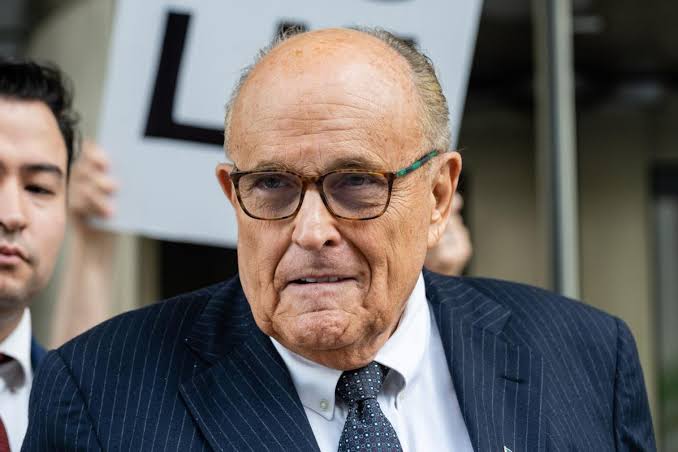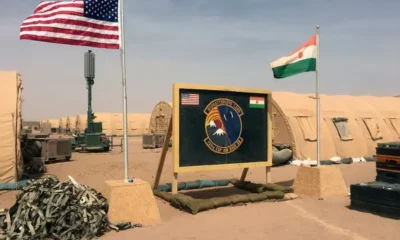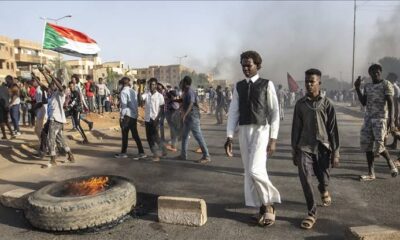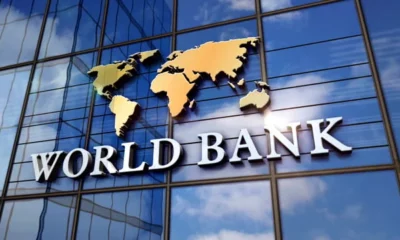Strictly Personal
Prigozhin, Giuliani and the case of self-destructing by arrogance a person… By Jenerali Uliwemgu
Published
8 months agoon

The institution of “poetic justice“ that we invoke so frequently in our discourse is neither lyrical nor fair. It often has neither verse nor rhyme, and can sometimes be delivered with utmost blandness. That said, the expression still carries a certain moral strength to warn all of us humans to guard against extreme behaviour in all that we do, for retribution is not very far from where we stand.
Cases of what I am driving at this week are legion, but it will suffice for now to treat only two cases we have heard of this past few days, that is the cases of Rudolf Louis William Giuliani and Yevgeny Victorovich Prigozhin, a whole wide world apart and yet drawn close together by the headlines.
The American in this story made himself a great name as a public prosecutor against the Mafia bosses in New York in the 1980s, earning a reputation of toughness against crime.
He collected a number of plaudits, even an honorary knighthood from England’s Queen Elizabeth ll, riding on a wave of popular approval as a tough crime buster and became a popular mayor of the Great Apple.
Now he finds himself being prosecuted under the same laws he wielded against the Mob in the 1980s, including the charge of racketeering, referring to the trouble he went through trying to reverse the last presidential election which his pal Donald Trump lost but whose loss he refused to accept.
Giuliani’s problems with law enforcement seem to stem from his almost blind loyalty to Trump, an unquestioning friendship which suggests that if the former president told him to follow him to hell he would only ask for a few minutes to collect his toothbrush.
Yet at the same time, he is the lawyer who warned Trump about an orange jumper-suit, which they could soon both be wearing if the courts find them culpable.
Well, the process has started, the lawyering has brought in the heaviest legal firepower money can buy, and the outcome cannot be predicted.
Compared to Giuliani, it is clear Prigozhin’s problems ended last Thursday when his plane dropped from the sky, if indeed it is true, he was one of the ten passengers on that flight.
Still, it is useful to spend a minute on this man who has been described as Russia’s most powerful mercenary and a personal friend of Russia President Vladimir Putin.
He seems to be the very epitome of the “poetry” in the “justice” I am talking about here. Having been literally a thief and a robber, there can be little doubt as to why Putin saw his usefulness. The man in the Kremlin saw what he could do with a man with zero integrity but endowed with great quantities of greed for power and money, unscrupulous and daring.
In situations like Crimea, Ukraine, Syria, Mali, Burkina Faso, Niger and elsewhere, there were stupendous opportunities for the two men to make enough to enable them to retire comfortably anywhere in the world.
At the same time, ‘Putin’s Chef’ and his ragtag gangsters of an army, ranged across the Sahara to salvage tottering regimes, were making uranium accessible, and that has its uses for a resurgent Russia eager to occupy the seat once occupied by the erstwhile Soviet Union.
So, the Chef could make a sumptuous meal of what he could lay his hands on in Africa, and as long as he shared the spoils with Putin, he was okay.
But thuggery does not obey rules of good behaviour and etiquette, and once he had opened up huge and unlimited vistas of the expansive Sahara, his imagination new no bounds, and he began thinking that he could challenge his former boss.
Shaaban Robert, the great Kiswahili savant once wrote (in Kusadikika) that once the termite gets attracted to mortality, it grows a pair of little wings that it uses to fly to its perdition. The Chef had tired of just cooking and now wanted to be the host at the banquet.
It is a measure of the man’s stupid arrogance — probably caused by narcissism — that he thought he could do what he did in June and still live in Russia, and still catch a plane every whenever he needed to catch one.
There can be no doubt that this mercenary’s attempted march on Moscow hurt Putin to the bone and that he would find his moment to deliver his lesson to his Chef in a way that would not only chastise him but would be done in a particular manner, pour encourager les autres.
Thus, a quiet, neat knife stab in the sand dunes outside Timbuktu at night would be out of the question, in favour of the dramatic optics of a kite hurtling to the ground from above the Muscovite skies; it is memorable.
Arguably, donning orange overalls for Giuliani – if it comes to that – would be a much easier fate than being in a tumbling plane, although a prison term is not exactly an Ibiza holiday cruise.
Still, the lesson to be drawn from this week’s headlines is that we all have to accept that our actions have consequences, and too often we find that the best choice is to err on the side of caution: the Chef should have run, and Giuliani should have shunned his friend.
You may like
-


US to withdraw military personnel from Niger— Source
-


Air Peace, capitalism and national interest, By Dakuku Peterside
-


Sudan conflict: US plans $100 million aid response
-


Russia begins diesel exports to Sudan as EU boycott bites
-


US wants more funding in response to Sudan conflict
-


US Home Commissioner warns Niger coup could increase EU immigration
Strictly Personal
Air Peace, capitalism and national interest, By Dakuku Peterside
Published
2 weeks agoon
April 16, 2024
Nigerian corporate influence and that of the West continue to collide. The rationale is straightforward: whereas corporate activity in Europe and America is part of their larger local and foreign policy engagement, privately owned enterprises in Nigeria or commercial interests are not part of Nigeria’s foreign policy ecosystem, neither is there a strong culture of government support for privately owned enterprises’ expansion locally and internationally.
The relationship between Nigerian businesses and foreign policy is important to the national interest. When backing domestic Nigerian companies to compete on a worldwide scale, the government should see it as a lever to drive foreign policy, and national strategic interest, promote trade, enhance national security considerations, and minimize distortion in the domestic market as the foreign airlines were doing, boost GDP, create employment opportunities, and optimize corporate returns for the firms.
Admitted nations do not always interfere directly in their companies’ business and commercial dealings, and there are always exceptions. I can cite two areas of exception: military sales by companies because of their strategic implications and are, therefore, part of foreign and diplomatic policy and processes. The second is where the products or routes of a company have implications for foreign policy. Air Peace falls into the second category in the Lagos – London route.
Two events demonstrate an emerging trend that, if not checked, will disincentivize Nigerian firms from competing in the global marketplace. There are other notable examples, but I am using these two examples because they are very recent and ongoing, and they are typological representations of the need for Nigerian government backing and support for local companies that are playing in a very competitive international market dominated by big foreign companies whose governments are using all forms of foreign policies and diplomacy to support and sustain.
The first is Air Peace. It is the only Nigerian-owned aviation company playing globally and checkmating the dominance of foreign airlines. The most recent advance is the commencement of flights on the Lagos – London route. In Nigeria, foreign airlines are well-established and accustomed to a lack of rivalry, yet a free-market economy depends on the existence of competition. Nigeria has significantly larger airline profits per passenger than other comparable African nations. Insufficient competition has resulted in high ticket costs and poor service quality. It is precisely this jinx that Air Peace is attempting to break.
On March 30, 2024, Air Peace reciprocated the lopsided Bilateral Air Service Agreement, BASA, between Nigeria and the United Kingdom when the local airline began direct flight operations from Lagos to Gatwick Airport in London. This elicited several reactions from foreign airlines backed by their various sovereigns because of their strategic interest. A critical response is the commencement of a price war. Before the Air Peace entry, the price of international flight tickets on the Lagos-London route had soared to as much as N3.5 million for the economy ticket. However, after Air Peace introduced a return economy class ticket priced at N1.2 million, foreign carriers like British Airways, Virgin Atlantic, and Qatar Airways reduced their fares significantly to remain competitive.
In a price war, there is little the government can do. In an open-market competitive situation such as this, our government must not act in a manner that suggests it is antagonistic to foreign players and competitors. There must be an appearance of a level playing field. However, government owes Air Peace protection against foreign competitors backed by their home governments. This is in the overall interest of the Nigerian consumer of goods and services. Competition history in the airspace works where the Consumer Protection Authority in the host country is active. This is almost absent in Nigeria and it is a reason why foreign airlines have been arbitrary in pricing their tickets. Nigerian consumers are often at the mercy of these foreign firms who lack any vista of patriotism and are more inclined to protect the national interest of their governments and countries.
It would not be too much to expect Nigerian companies playing globally to benefit from the protection of the Nigerian government to limit influence peddling by foreign-owned companies. The success of Air Peace should enable a more competitive and sustainable market, allowing domestic players to grow their network and propel Nigeria to the forefront of international aviation.
The second is Proforce, a Nigerian-owned military hardware manufacturing firm active in Rwanda, Chad, Mali, Ghana, Niger, Burkina Faso, and South Sudan. Despite the growing capacity of Proforce in military hardware manufacturing, Nigeria entered two lopsided arrangements with two UAE firms to supply military equipment worth billions of dollars , respectively. Both deals are backed by the UAE government but executed by UAE firms.
These deals on a more extensive web are not unconnected with UAE’s national strategic interest. In pursuit of its strategic national interest, India is pushing Indian firms to supply military equipment to Nigeria. The Nigerian defence equipment market has seen weaker indigenous competitors driven out due to the combination of local manufacturers’ lack of competitive capacity and government patronage of Asian, European, and US firms in the defence equipment manufacturing sector. This is a misnomer and needs to be corrected.
Not only should our government be the primary customer of this firm if its products meet international standards, but it should also support and protect it from the harsh competitive realities of a challenging but strategic market directly linked to our national military procurement ecosystem. The ability to produce military hardware locally is significant to our defence strategy.
This firm and similar companies playing in this strategic defence area must be considered strategic and have a considerable place in Nigeria’s foreign policy calculations. Protecting Nigeria’s interests is the primary reason for our engagement in global diplomacy. The government must deliberately balance national interest with capacity and competence in military hardware purchases. It will not be too much to ask these foreign firms to partner with local companies so we can embed the technology transfer advantages.
Our government must create an environment that enables our local companies to compete globally and ply their trades in various countries. It should be part of the government’s overall economic, strategic growth agenda to identify areas or sectors in which Nigerian companies have a competitive advantage, especially in the sub-region and across Africa and support the companies in these sectors to advance and grow to dominate in the African region with a view to competing globally. Government support in the form of incentives such as competitive grants ,tax credit for consumers ,low-interest capital, patronage, G2G business, operational support, and diplomatic lobbying, amongst others, will alter the competitive landscape. Governments and key government agencies in the west retain the services of lobbying firms in pursuit of its strategic interest.
Nigerian firms’ competitiveness on a global scale can only be enhanced by the support of the Nigerian government. Foreign policy interests should be a key driver of Nigerian trade agreements. How does the Nigerian government support private companies to grow and compete globally? Is it intentionally mapping out growth areas and creating opportunities for Nigerian firms to maximize their potential? Is the government at the domestic level removing bottlenecks and impediments to private company growth, allowing a level playing field for these companies to compete with international companies?
Why is the government patronising foreign firms against local firms if their products are of similar value? Why are Nigerian consumers left to the hands of international companies in some sectors without the government actively supporting the growth of local firms to compete in those sectors? These questions merit honest answers. Nigerian national interest must be the driving factor for our foreign policies, which must cover the private sector, just as is the case with most developed countries. The new global capitalism is not a product of accident or chance; the government has choreographed and shaped it by using foreign policies to support and protect local firms competing globally. Nigeria must learn to do the same to build a strong economy with more jobs.
Strictly Personal
This is chaos, not governance, and we must stop it, By Tee Ngugi
Published
2 weeks agoon
April 10, 2024
The following are stories that have dominated mainstream media in recent times. Fake fertiliser and attempts by powerful politicians to kill the story. A nation of bribes, government ministries and corporations where the vice is so routine that it has the semblance of policy. Irregular spending of billions in Nairobi County.
Billions are spent in all countries on domestic and foreign travel. Grabbing of land belonging to state corporations, was a scam reminiscent of the Kanu era when even public toilets would be grabbed. Crisis in the health and education sectors.
Tribalism in hiring for state jobs. Return of construction in riparian lands and natural waterways. Relocation of major businesses because of high cost of power and heavy taxation. A tax regime that is so punitive, it squeezes life out of small businesses. Etc, ad nauseam.
To be fair, these stories of thievery, mismanagement, negligence, incompetence and greed have been present in all administrations since independence.
However, instead of the cynically-named “mama mboga” government reversing this gradual slide towards state failure, it is fuelling it.
Alternately, it’s campaigning for 2027 or gallivanting all over the world, evoking the legend of Emperor Nero playing the violin as Rome burned.
A government is run based on strict adherence to policies and laws. It appoints the most competent personnel, irrespective of tribe, to run efficient departments which have clear-cut goals.
It aligns education to its national vision. Its strategies to achieve food security should be driven by the best brains and guided by innovative policies. It enacts policies that attract investment and incentivize building of businesses. It treats any kind of thievery or negligence as sabotage.
Government is not a political party. Government officials should have nothing to do with political party matters. They should be so engaged in their government duties that they literally would not have time for party issues. Government jobs should not be used to reward girlfriends and cronies.
Government is exhausting work undertaken because of a passion to transform lives, not for the trappings of power. Government is not endless campaigning to win the next election. To his credit, Mwai Kibaki left party matters alone until he had to run for re-election.
We have corrupted the meaning of government. We have parliamentarians beholden to their tribes, not to ideas.
We have incompetent and corrupt judges. We have a civil service where you bribe to be served. Police take bribes to allow death traps on our roads. We have urban planners who plan nothing except how to line their pockets. We have regulatory agencies that regulate nothing, including the intake of their fat stomachs.
We have advisers who advise on which tenders should go to whom. There is no central organising ethos at the heart of government. There is no sense of national purpose. We have flurries of national activities, policies, legislation, appointments which don’t lead to meaningful growth. We just run on the same spot.
Tee Ngugi is a Nairobi-based political commentator
EDITOR’S PICK


Al Ahly, Esperance to clash in CAF Champions League final
Two of Africa’s club giants, Egypt’s Al Ahly and Esperance of Tunisia, will do battle next month over two legs...


Collabo with Burna Boy enabled me buy house for my mum— Mozambican DJ Tarico
Mozambican disc jockey and sound-producer, DJ Tarico, has credited Nigeria’s Afrobeats sensation, Burna Boy, with his sudden wealth which enabled...


RepAir, Cella partner to launch carbon capture in Kenya
Global Direct Air Capture (DAC) firm, RepAir, has entered into a partnership with carbon storage technology company, Cella, to launch...


Mapanza traditional council shares positive outlook on media rights, freedom of expression
Jonathan Muchindu, a representative of the Traditional Council of Mapanza Chiefdom in Choma District, Southern Province, Zambia, asserts that the...


World Bank grants Malawi $57.6 million for food crisis
As a response to its food crisis, the World Bank said on Friday that it would give Malawi $57.6 million...


Nigeria loses N1.29trn annually to crude oil theft, vandalism— Reps Speaker
Speaker of Nigeria’s House of Representatives, Hon. Abbas Tajudeen, has revealed that the country loses a whopping sum of N1.29...


Intel Liftoff Hackathon 2024 calls for applications from African AI startups
Applications for the 2024 cohort of Intel Liftoff Hackathon has opened for African AI startups designed to bring together aspiring...


African men run away from single mothers— Joselyn Dumas
Veteran Ghanaian actress and media personality, Joselyn Dumas, has lamented the fact that most African men shy away from getting...


Former Zambian captain Rainford Kalaba discharged from hospital after near-fatal accident
Former Zambian national team captain, Rainford Kalaba, has been discharged from hospital weeks after he was involved in a near-fatal...


‘Cyber Act fails to protect the vulnerable,’ Student demands media inclusivity for persons with disabilities
Peter Libila, a student at Icof University’s Chipata campus, highlights the lack of awareness among individuals with disabilities and those...
Trending
-

 Metro1 day ago
Metro1 day ago‘Cyber Act fails to protect the vulnerable,’ Student demands media inclusivity for persons with disabilities
-

 Sports1 day ago
Sports1 day agoFormer Zambian captain Rainford Kalaba discharged from hospital after near-fatal accident
-

 Tech24 hours ago
Tech24 hours agoIntel Liftoff Hackathon 2024 calls for applications from African AI startups
-

 Metro1 day ago
Metro1 day agoNigeria govt cancels 924 dormant mining licences


